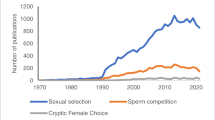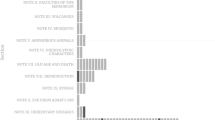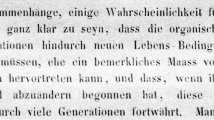Abstract
THIS interesting essay is one of the relaxations that Prof. P. J. Cole has allowed himself in the course of his labours on a “History of Zoology“, and we cannot but hope that he may make yet other diversions of a similar nature, provided, of course, that the progress of the magnum opus is not unduly delayed. Sexual generation is a subject that the inquisitive mind has always been prone to play with, and thus the history is often very picturesque, even grotesquely so. This is well illustrated by the persistence with, which observers, who should have known better, discerned and designed within the spermatozoon the lineaments of a fœtus.
Early Theories of Sexual Generation.
Dr. P. J. Cole. Pp. x + 230 + 10 plates. (Oxford: Clarendon Press; London: Oxford University Press, 1930.) 15s. net.
This is a preview of subscription content, access via your institution
Access options
Subscribe to this journal
Receive 51 print issues and online access
$199.00 per year
only $3.90 per issue
Buy this article
- Purchase on Springer Link
- Instant access to full article PDF
Prices may be subject to local taxes which are calculated during checkout
Similar content being viewed by others
Rights and permissions
About this article
Cite this article
T., J. De Generatione . Nature 127, 351–353 (1931). https://doi.org/10.1038/127351a0
Issue Date:
DOI: https://doi.org/10.1038/127351a0
Comments
By submitting a comment you agree to abide by our Terms and Community Guidelines. If you find something abusive or that does not comply with our terms or guidelines please flag it as inappropriate.



